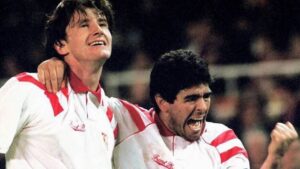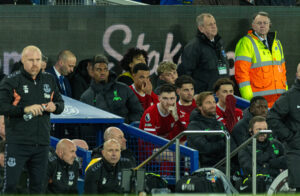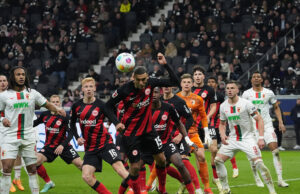Earlier this week, FIFA president Gianni Infantino was making more noise. This time it was not focused on the biennial World Cup. Instead, he announced his latest dream: Isreal co-hosting the World Cup with their Arab neighbours, including Palestine.
Such an event would be poignant. Is it realistic? Far from it. What the statement shows is how far Infantino is willing to dream as FIFA president. On the other side, it suggests his mind is possessed by an unwitting acknowledgement of how far football can be pushed as a moderator between people.
Consequently, he is a big dreamer who fails to see football’s limitations. Due to his course, he is following the same path as his predecessor, Sepp Blatter.
Gianni Infantino: The Return of Sepp Blatter’s Legacy
Blatter’s Failed Pursuit for Peace
Sepp Blatter once had a dream as Infantino does now. The former FIFA president believed North and South Korea could be united. The solution did not include setting up meetings to discuss political matters or an official peace deal.
Far from it. The vehicle to peace was instead going to come through a different avenue: football. It is unconventional, to say the least, but Blatter preached of its power.
“There is no doubt that Korea should be ready to organise a good World Cup,” the Swiss national said in 2010. “Football is more than a game, as it has a socio-cultural impact and can therefore connect people all over the world,”
What Blatter failed to mention at the time was the scale of the job. Not only did the sport have to do what he said, but it also had to break down sixty years worth of political, economic, social and cultural differences.
For context, the two regions have been divided since the Korean War began in 1950. The North was supported by USSR and China, while the South was backed by the United States with the United Nations authorisation.
Ideological division engulfed the post-World War II climate due to the Cold War. Korea was the first country that saw a proxy war break out between East and West. Joseph Stalin, the dictator of the USSR, manoeuvred to capitalise on Mao Zedong’s victory in China. He saw Korea as a space to expand his sphere of influence in the wake of the Japanese Empire collapsing. The United States were fearful of Stalin succeeding just like he had done in Eastern Europe and China.
The fighting came to a halt in July 1953, five months after Stalin’s death, with an armistice that has kept the North and South divided to this day. A peace deal has never been struck, resulting in the war being stuck in a frozen conflict.
This was the backdrop on which Blatter believed he could unite the two countries through a World Cup. Unsurprisingly, his dream was just that: a dream. It quickly perished and the 2022 World Cup instead went to Qatar.
Three years down the road, Blatter again saw himself as a peace broker. He thought a Handshake for Peace would begin the process of peace between Isreal and Palestine. After just one known occurrence, the idea disappeared.
Before his time was up, Blatter desperately wanted a Nobel Peace Prize for his work and vision. It would be a gift to the football world and the final piece to his legacy. Alternatively, football disposed of Blatter and he faded into the shadows. Only for Gianni Infantino to resurrect his legacy.
‘Football Can Bring Peace’
“You need to have vision, dreams and ambitions,” said the FIFA president during a speech to the Jerusalem Post’s Tenth Annual Conference.
“In recent months, I was in Dubai where the UAE Football Association and the Israel Football Association have signed a historic agreement. I think that co-hosting is the future, so why not dreaming and thinking about it, be it at youth or senior level, men or women, because the FIFA World Cup has this unique magic in bringing people together and in uniting people.”
This was not the only speech Infantino made in his two-day visit to Isreal. On another occasion, Infantino spoke to The Friedman Center For Peace through Strength event at the ‘Museum of Tolerance’ in Jerusalem.
The FIFA president told his audience that he heard Jews and Arabs play together in Isreal and that Palestine should be a part of the coalition of peace.
“When it comes to peace, Palestine should also be a part of it. If there is a connection with Palestine through football, maybe it will help all of us, and later also the politicians, to make this region and this world better.
“We do the World Cup in countries like Qatar to connect the world together and get to know other cultures, and we would like that to happen in Israel as well, why not? My dream is to make a regional event between you and your neighbours. In football, you have to work for your future.
“Why not dream of a World Cup in Israel and its neighbours? Following the Abraham accords, why not do it here as well in conjunction with the neighbours in the Middle East and the Palestinians?”
For Infantino, these comments showed his lofty goals as a football administrator. It was not good enough to correct the wrongs of the current issues. Football must expand beyond its boundaries and be used as a mechanism for peace. And this was not the first time he expelled such beliefs.
The FIFA president publicly exhibited them when he hoped the 2022 World Cup would be expanded to the region in 2018. This included countries that were politically against Qatar, such as Saudi Arabia. The blockade of Qatar was a stinging point for four years but it was eventually resolved without football’s involvement in January earlier this year.
In addition to it being too late to increase the tournament participation to the outside of the small peninsula, there was little indication Qatar wanted to share their prized asset with their local rivals.
Nonetheless, Infantino continued to push his belief that football has a role in peace brokering and social development. At a G20 meeting in the same year, he referred to Iran accepting women into stadiums, and India and African countries using football clinics to better their attitudes towards women as two examples.
“Football can bring us together and make the world a more prosperous, educated, equal and, perhaps even, peaceful place,” the FIFA president told the G20.
With this in mind, a normalisation of relations between Israel, the UAE, Bahrain, Oman, Morocco and Sudan is a clear opportunity for Infantino to rekindle his alleged role as a peace broker and rights developer.
But such ambitions do not weigh on everybody’s mind when historical differences exist. In this instance, there is a big one. Infantino’s simplistic belief held little weight in the eyes of the Palestinian Football Association (PFA), who was due to meet the FIFA president after his Isreal visit.
The Cost of Ambition
The Mamilla Islamic cemetery dates back to the 11th century and is the oldest Muslim cemetery in Jerusalem. However, the Friedman Centre for Peace through Strength at the Museum of Tolerance, linked to former Trump ambassador David Friedman, was built on the land.
Gianni Infantino’s visit to the area was deemed incomprehensible to the PFA. They saw Infantino supporting Isreal politically, even though they made the FIFA president aware of their considerations. In their view he ignored them. They released a statement stating they regret his decision and cancelled their meeting.
Before it seemed the president’s trip was going to be a success. Palestine understood and accepted he would be meeting them after Isreal to talk football development and cohesion. Instead, Infantino’s visit pulled the possibility off the tracks.
The PFA viewed the event “as a total affrontment to the values of religious tolerance and peaceful coexistence, both endorsed by the FIFA statutes”.
Further condemnation followed as the PFA president, Jibril Rajoub, believed Infantino was politicising football and that his “participation will be seen as a desecration of the Holy Site and will not contribute to bringing people together, but rather pull them apart”.
In summary, Infantino’s and FIFA’s rhetoric was hypocritical. They were seemingly going against their commitment to peaceful co-existence and human rights due to their willingness to attend the event.
The reaction is unsurprisingly considering the history of the two countries. Nevertheless, Palestine’s furious reaction symbolises the cost of Infantino’s ambition.
Like Blatter, the FIFA president is failing to understand the scale of his vision. A World Cup cannot solve an issue that backdates 60 or 100 years. A tournament does not bring a fix to ingrained territorial, religious and political differences. These are forces that go far beyond football remit.
The idea at such only suggests he is searching for political grandstanding. For all the influence Infantino believes he has amongst presidents, kings and autocratic rulers, there are far bigger ones outside of football and even bigger ones who use football for their own clout.
All this leaves Gianni Infantino washed with big ideas and big dreams and little substance to turn such concepts into reality; something that Blatter felt when football officially shut the doors on him six years ago.
Main Photo






